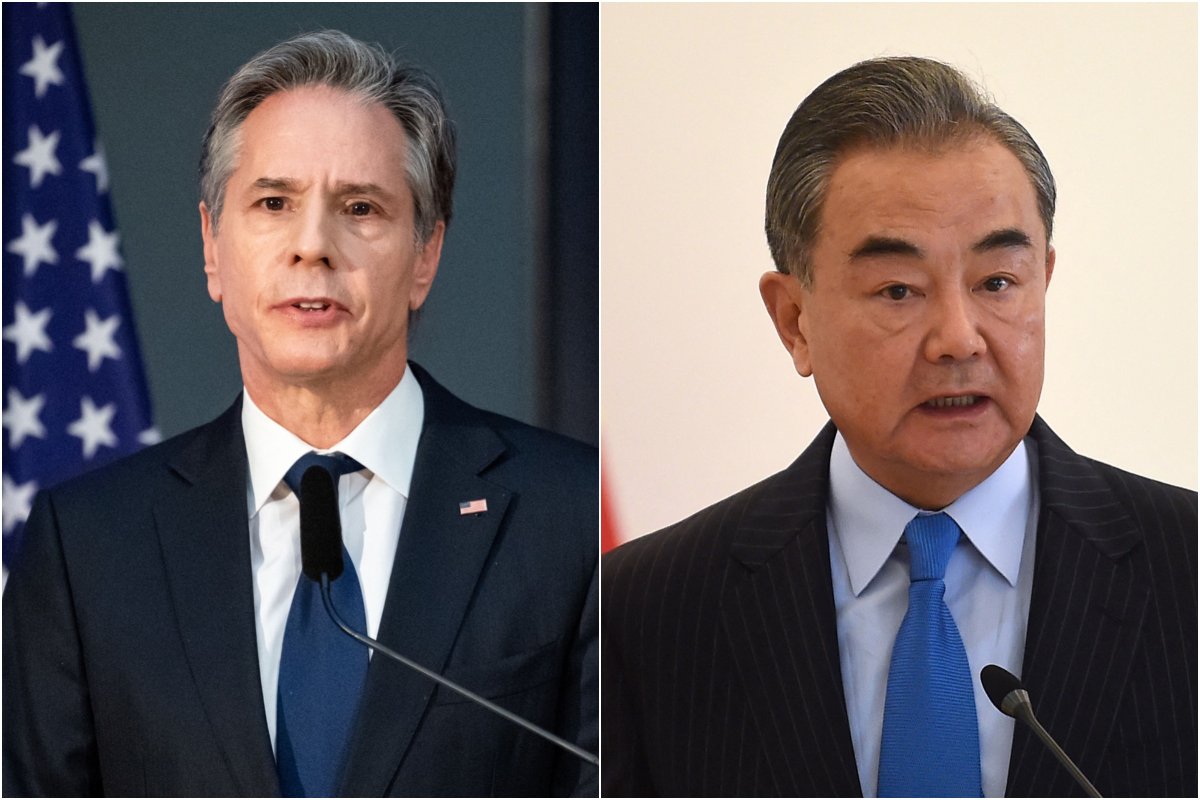China gave the United States a list of three priorities on Thursday, as its top diplomat bemoaned the lack of progress in bilateral relations despite the arrival of a new president inside the White House.
In his call with Secretary of State Antony Blinken, Chinese Foreign Minister Wang Yi said the Joe Biden administration had sent more positive signals than those received under Donald Trump, but that he was unhappy about "new shocks" that continued to emerge in the already delicate U.S.-China relationship.
Wang said President Biden responded positively to Xi Jinping's "three principles of mutual respect, peaceful coexistence and win-win cooperation" when China's leader proposed the guidelines during their high-level summit last November. Quoting Biden, the Chinese diplomat said the U.S. "does not seek a 'new Cold War,' does not seek to change China's system, does not seek to strengthen its alliances in order to oppose China, does not support 'Taiwan independence,' and does not intend on conflict and confrontation with China."
Biden "put out positive messages that differed from the previous government," said Wang. "However, what the world sees is that the tone of U.S. policy toward China has not undergone substantive change; nor [have] President Biden's statements been truly implemented."
"The U.S. continues its wrong words and actions against China, causing new shocks in bilateral relations," Wang told Blinken, according to a lengthy readout published by China's Foreign Ministry.
"As a matter of urgency, the U.S. should stop interfering in the Beijing Winter Olympics, stop playing with fire on the Taiwan issue and stop creating various anti-China 'cliques' to contain China," he said. The press statement was in stark contrast to the one paragraph released by the State Department.
For the Chinese government, Beijing 2022, which opens on February 4, is among its most important spectacles this decade. It expects to host a safe and successful games, despite lingering concerns over small COVID clusters in the city. The competition will contribute to Xi's list of achievements as leader, with the Chinese Communist Party expected to hand him a third term this autumn.
China therefore hasn't taken kindly to the American-led Western boycott of the Winter Olympics, over what Washington and other major governments say are ongoing human rights violations—amounting to genocide—against Uyghurs and other mainly Muslim minorities in China's northwest Xinjiang region. Beijing argues the accusations are fabricated, and denies any wrongdoing.
This week, China said it complained to the U.S. about a pending decision to evacuate up to one-quarter of American diplomats and their families from the country. U.S. officials are said to be concerned about being subjected to "intrusive pandemic control measures" against their will, such as forced admittance to hospitals and the separation of children from parents.
Containing the Pandemic
A State Department spokesperson told Newsweek on Wednesday that the operating status of its embassy and consulates in China hadn't changed. China appeared to see the move as an attempt to undermine its hosting of the Olympics, which is predicated in part on its successful containment of the pandemic.
Meanwhile, Washington's support for Taiwan is a decades-long sticking point in U.S.-China relations that has become more pronounced under the Biden administration, which has successfully turned the island's security into a matter of global concern, even among the American public. Despite openly denying that it backs Taiwan's independence movement, U.S. diplomatic and military moves are seen as standing in the way of Beijing's ambition to "unify" the democratic island, which says it is already a functionally independent state.
Similarly, China views so-called "minilateral" initiatives like the Quad—between the U.S., India, Australia and Japan—and the more recent AUKUS security pact—between Australia, the U.K. and U.S.—as pointed moves to contain its military growth in Asia and throughout the wider Indo-Pacific region. American officials say the groups don't target any one country.
Coexisting Peacefully
During their call, Wang told Blinken that China and the U.S. needed to "guarantee" that neither would seek to change the other in order to "coexist peacefully in the future." The two countries should "expand the positive aspects of bilateral cooperation," he said.
Wang warned that external pressure would only "make the Chinese people more united." Confrontation with the U.S. "will not stop China from growing strong," he concluded.
Since taking office a year ago, Biden has reversed a number of Trump-era approaches to China, including a re-emphasis on multilateral institutions, toning down hawkish anti-China rhetoric as well as seeking cooperation on climate change and in other areas.
However, his economic policy remains largely same, maintaining tariffs on some $350 billion worth of Chinese goods—a result of the trade war Trump started in 2018. The Biden administration has determined that China failed to meet elements of the phase one trade agreement inked in mid-January 2020, just weeks before the world was engulfed by the COVID pandemic.
On Wednesday, a World Trade Organization arbitrator in Geneva gave Beijing the green light to impose retaliatory duties against the U.S. on $645 million worth of American exports.

Uncommon Knowledge
Newsweek is committed to challenging conventional wisdom and finding connections in the search for common ground.
Newsweek is committed to challenging conventional wisdom and finding connections in the search for common ground.
About the writer
John Feng is Newsweek's contributing editor for Asia based in Taichung, Taiwan. His focus is on East Asian politics. He ... Read more
To read how Newsweek uses AI as a newsroom tool, Click here.








